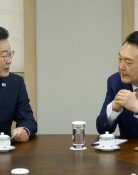Korea, Japan to Meet Again in Classic
Team Koreas manager had a short-lived career as a player, but is having a long one as a leader.
After graduating from Baemoon High School, Kim In-shik joined the strongest corporate team at the time, the Hanil Bank team, but quit after frequent injuries in 1972 at the age of 25.
When pro baseball was introduced to Korea in 1982, Kim did not join the league as a manager at first. It was only in 1986, after an invitation by then Haitai manager Kim Eung-ryong, now manager of Samsung, that he stepped into the world of the pros as a pitching coach.
In contrast, Japans manager Sadaharu Oh is undoubtedly a superstar. After joining Japans finest baseball team, Yomiuri, in 1959 at the age of 19, his team won for nine consecutive seasons. He won his first home run title within three years, and he went on to win the next 11.
Although some of his records were broken in 2003 by Samsungs Lee Seung-yeop (Yomiuri), he set the Asian record in 1964 with 55 home runs and the world record (not acknowledged) with 868 home runs total.
The two managers leadership resumes are comparable. Kim debuted as manager in the pro leagues at Ssangbangul, a perennial underachiever, in 1990. His prospects of becoming a winning manager were bleak. In contrast, Oh was drafted into Yomiuri immediately after his retirement as a player.
Their philosophies on baseball are even more different. Koreas big baseball and Japans small ball styles have been the talk of the WBC, and stem from the different styles of the two managers.
While Kim acknowledges the importance of a players abilities, he stresses experience, and he bets on the perseverance of players that show potential. His favorite quote is that you can lead a horse to the river but you cant force it to drink.
A prime example may be his insertion of Choi Hee-seop (Los Angeles Dodgers) as the teams cleanup hitter later in the tourney, despite his lackluster performance, as well as the surprise entry of younger player Jun Byung-doo (Kia). Choi Hee-seop later went on to hit a decisive three-run homer in the game against the U.S. on March 14, while Jun Byung-doo contributed to Koreas effective mound corps.
In contrast, Oh values small ball skills such as base running and bunting. Stressing the importance of data, he does not hesitate to replace even ace or home run hitters. Some critics say that he treats his players more like machinery parts than human beings.
But his style was enough to compete with the U.S. and Mexico, and it has attracted the attention of fans and the media who see how it contrasts with Koreas.
The game between Korea and Japan at noon on March 19 at San Diegos Petco Park will be a desperate one, because the winner will advance to the finals.
At the Asian preliminaries held on March 5 at Japans Tokyo Dome and their quarterfinal game at Angels Stadium in Anaheim, Korea won by one run both times.
If the tourney ended today, the Korean-Japanese rivalry would have been recorded as a complete victory for Korea and Kim. But after Mexico won its game against the U.S., 2-1 on March 17, Japan automatically qualified for second place, thus ensuring a third game between the two countries.
The first two victories have now lost their significance. Japanese baseball star Suzuki Ichiros 30-year guarantee is still a thing of the present. The team that wins the semifinals will be recorded in history, while the losing team will be sent packing.
Hwan Soo Zang zangpabo@donga.com







